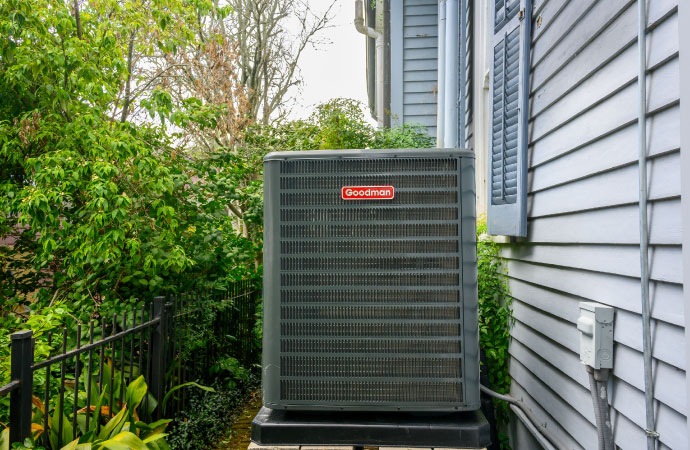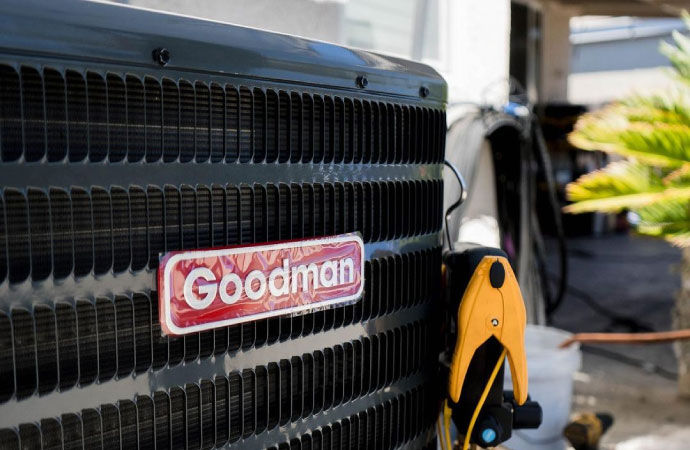“Great company. Very honest, reliable and fair pricing. They came out to do a service on my A/C unit. Robert who was amazing explained everything to me and showed me where there was a coil leak. They’re coming back out to do the repair for me. Would definitely recommend this company to anyone I know. Hard to find good honest companies these days but speaking from experience Ewing & Ewing is one you can trust. 10/10"
18 Months Same as Cash Financing Available!

Goodman HVAC Systems in West Palm Beach
Using the right products secures flawless services and provides sustainability. Ewing & Ewing Air Conditioning always prioritizes customer satisfaction. We have consistently applied top-grade products, and Goodman is one of them.
Along with the superior service of experienced technicians, our HVAC services allow you to get the full benefits of Goodman products. Set an appointment with our service team to retain the comfort of your indoor atmosphere. We are available at the number 561-220-6484. To contact us online, fill out the service request form.
Why You Shouldn't Go for Non-brand Products
The biggest perk is usually the price. Although generic brands can be significantly cheaper than their brand-name counterparts, opting for non-brand products, especially in critical areas such as home appliances, electronics, or consumables, can often lead to several drawbacks.

- Quality Uncertainty: One of the significant differences between brand products and non-brand products is quality and performance. Since brands have a reputation to uphold, they often invest in quality control to maintain consistent product performance. With non-branded items, quality can vary greatly, and you might end up with something that breaks easily or doesn't work as well.
- Safety Issues: Brands will likely adhere to safety standards and regulations, especially for electronics or appliances. Non-branded products may not undergo the same rigorous testing, cause severe electrical accidents, and potentially pose a safety risk.
- Consistency: Branded products offer consistent quality and performance across different units. Non-brand products can vary significantly from item to item, making it hard to predict what you're getting.
- Customer Service: Established brands typically have dedicated customer service departments to answer questions, troubleshoot problems, and offer warranties. You might not get the same level of support with non-branded products. Ultimately, that results in a waste of money, a bad experience, and a hampering of peace of mind.
- Features and Innovation: Brands often invest in research and development to create unique features and stay ahead of the curve. Generic versions don't have the expected features, may be more straightforward, and lack the latest advancements.
- Reliability and Warranty: Branded products frequently come with warranties that ensure a replacement or repair if something malfunctions. Non-branded products may not have warranties; it won't be surprising if they are defective or expire before their expected lifetime, leaving you on the hook for replacements. Therefore, it would be a bad investment to go for any non-brand products.
- Resale Value: Branded products tend to hold their value better over time. If you decide to sell or upgrade, branded items will likely fetch a higher resale price than non-brand alternatives, which often depreciate quickly.
- Aesthetics and Design: Brand-name products often have better design and aesthetics, which can enhance the look and feel of your home or workplace. Non-brand products might not pay as much attention to design details, resulting in less visually appealing items.
While non-brand products might seem appealing due to their lower prices, the potential downsides often outweigh the savings. Investing in reputable brands like Goodman can ultimately save you time, money, and hassle in the long run, ensuring a better experience and higher satisfaction with your purchases.
Benefits That Come with Goodman Products
For residential or commercial use, Goodman HVAC systems provide reliable and efficient solutions for various heating and cooling needs:

- High Quality and Reliability: Goodman products are known for their durability and dependable performance. The company uses high-quality materials and adheres to strict manufacturing standards, ensuring their HVAC systems are built to last.
- Energy Efficiency: Goodman HVAC systems are designed to be energy-efficient, helping to reduce utility bills and minimize environmental impact. Many of their products meet or exceed energy efficiency standards set by organizations like ENERGY STAR.
- Affordability: Goodman offers high-quality HVAC solutions at competitive prices. Their products provide excellent value for money, making them accessible to many customers without compromising quality or performance.
- Comprehensive Warranties: Goodman stands behind their products with robust warranties. These warranties often cover parts and compressors for extended periods, providing peace of mind and protecting your investment against potential issues.
- Advanced Technology: Goodman incorporates innovative technology into their HVAC systems. Features like variable-speed motors, smart thermostats, and advanced diagnostics enhance performance, comfort, and user convenience.
- Indoor Comfort and Air Quality: Goodman HVAC systems are designed to enhance indoor comfort and air quality. Features like humidity control, air purification, and consistent temperature regulation contribute to a healthier and more comfortable living environment.
- Industry Recognition: Goodman is widely recognized and respected in the HVAC industry. The brand frequently receives positive reviews from customers and industry experts, validating the reliability and effectiveness of its products.

HVAC Services We Provide
The BBB-accredited company has its service team across Royal Palm Beach, Palm Beach Gardens, Boynton Beach and other service areas in South Florida to help you with 24-hour emergency services. These services include:
Customer ReviewsEnhance the Value of Your Home with Our Professional Services
Ewing & Ewing Air Conditioning has four decades of professional experience in the industry. The family-owned business has drug and background-tested employees who know their tasks well. Dial 561-220-6484 to contact us online for our services.








